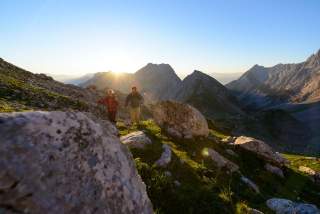1. Stay safe in the mountains
Hiking is an endurance sports activity. The intense strain on the cardiovascular system requires a healthy body and realistic self-assessment. Avoid time pressure and choose the right speed so that nobody in the group will get out of breath.
2. Careful planning
Hiking maps, guidebooks, the internet and experts inform you on trip duration, difference in altitude, difficulty and current conditions. Adapt your tours to the ability of the group! Pay special attention to the weather forecast as rain, wind and cold increase the risk of accidents
3. Complete equipment
Adapt your equipment to your trip and see to a low weight of your backpack. Always pack protection against rain, cold and sun as well as a first aid kit and mobile phone (Euroemergency hotline 112). A map or GPS will support your orientation.
4. Suitable footwear
Good hiking shoes protect and relieve stress on your feet – and improve surefootedness! Pay attention to perfect fit, anti-slip grip sole, water-proofness and low weight.
5. A sure foot is the key
Falling – as a consequence of slipping or stumbling – is the most common cause of accidents! Bear in mind that walking to fast and fatigue may strongly impair surefootedness and concentration. Beware of falling rocks: By walking attentively you avoid to set stones in motion.
6. Stay on marked trails
In pathless areas off the beaten track the risks of loss of orientation, falling and being hit by rocks increases. Avoid shortcuts and return to the last known position once you lost your track. Steep remaining snow fields are frequently underrated and dangerous!
7. Regular Breaks
Timely breaks support recreation and give you the possibility to enjoy the landscape and socialize. Eating and drinking is necessary to maintain your fitness and concentration. Isotonic drinks are ideal thirst-quenchers. Cereal bars, dried fruit and biscuits satisfy your hunger during the trip.
8. Responsibility for Children
Remember that change and discovering the natural world through play are paramount for children! During passages with an increased risk of falling one adult may only look after one child each. Extremely exposed trips requiring long-time concentration are not suitable for children.
9. Small groups
Small groups guarantee flexibility and encourage mutual help. Inform trusted persons on destination, route and return conditions. Stay together. Caution when you are alone: Already little incidents may lead to severe emergencies.
10. Respect nature and the environment
For protecting mountain regions: Do not litter, avoid unnecessary noise, stay on marked trails, do not disturb wild and grazing animals, do not touch plants and respect nature reserves. Use public transport or a car pool to get to your point of departure.
